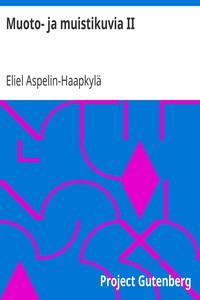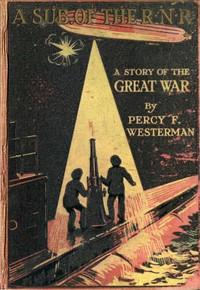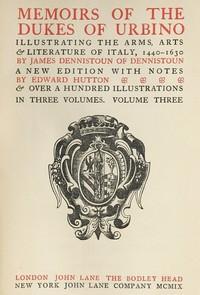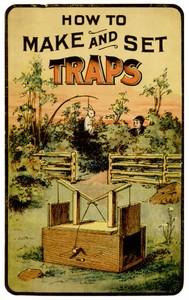Read this ebook for free! No credit card needed, absolutely nothing to pay.
Words: 88048 in 11 pages
This is an ebook sharing website. You can read the uploaded ebooks for free here. No credit cards needed, nothing to pay. If you want to own a digital copy of the ebook, or want to read offline with your favorite ebook-reader, then you can choose to buy and download the ebook.


: Muoto- ja muistikuvia II by Aspelin Haapkyl Eliel - Finland Civilization; Finland Intellectual life
PROBLEMS OF SCHOOL AND COLLEGE
THE IDEAL TEACHER
In America, a land of idealism, the profession of teaching has become one of the greatest of human employments. In 1903-04 half a million teachers were in charge of sixteen million pupils. Stating the same facts differently, we may say that a fifth of our entire population is constantly at school; and that wherever one hundred and sixty men, women, and children are gathered, a teacher is sure to be among them.
But figures fail to express the importance of the work. If each year an equal number of persons should come in contact with as many lawyers, no such social consequences would follow. The touch of the teacher, like that of no other person, is formative. Our young people are for long periods associated with those who are expected to fashion them into men and women of an approved type. A charge so influential is committed to nobody else in the community, not even to the ministers; for though these have a more searching aim, they are directly occupied with it but one day instead of six, but one hour instead of five. Accordingly, as the tract of knowledge has widened, and the creative opportunities involved in conducting a young person over it have correspondingly become apparent, the profession of teaching has risen to a notable height of dignity and attractiveness. It has moved from a subordinate to a central place in social influence, and now undertakes much of the work which formerly fell to the church. Each year divinity schools attract fewer students, graduate and normal schools more. On school and college instruction the community now bestows its choicest minds, its highest hopes, and its largest sums. During the year 1903-04 the United States spent for teaching not less than 0,000,000.
Such weighty work is ill adapted for amateurs. Those who take it up for brief times and to make money usually find it unsatisfactory. Success is rare, the hours are fixed and long, there is repetition and monotony, and the teacher passes his days among inferiors. Nor are the pecuniary gains considerable. There are few prizes, and neither in school nor in college will a teacher's ordinary income carry him much above want. College teaching is falling more and more into the hands of men of independent means. The poor can hardly afford to engage in it. Private schools, it is true, often show large incomes; but they are earned by the proprietors, not the teachers. On the whole, teaching as a trade is poor and disappointing business.
When, however, it is entered as a profession, as a serious and difficult fine art, there are few employments more satisfying. All over the country thousands of men and women are following it with a passionate devotion which takes little account of the income received. A trade aims primarily at personal gain; a profession at the exercise of powers beneficial to mankind. This prime aim of the one, it is true, often properly becomes a subordinate aim of the other. Professional men may even be said to offer wares of their own--cures, conversions, court victories, learning--much as traders do, and to receive in return a kind of reward. But the business of the lawyer, doctor, preacher, and teacher never squares itself by equivalent exchange. These men do not give so much for so much. They give in lump and they get in lump, without precise balance. The whole notion of bargain is inapplicable in a sphere where the gains of him who serves and him who is served coincide; and that is largely the case with the professions. Each of them furnishes its special opportunity for the use of powers which the possessor takes delight in exercising. Harvard College pays me for doing what I would gladly pay it for allowing me to do. No professional man, then, thinks of giving according to measure. Once engaged, he gives his best, gives his personal interest, himself. His heart is in his work, and for this no equivalent is possible; what is accepted is in the nature of a fee, gratuity, or consideration, which enables him who receives it to maintain a certain expected mode of life. The real payment is the work itself, this and the chance to join with other members of the profession in guiding and enlarging the sphere of its activities.
The idea, sometimes advanced, that the professions might be ennobled by paying them powerfully, is fantastic. Their great attraction is their removal from sordid aims. More money should certainly be spent on several of them. Their members should be better protected against want, anxiety, neglect, and bad conditions of labor. To do his best work one needs not merely to live, but to live well. Yet in that increase of salaries which is urgently needed, care should be used not to allow the attention of the professional man to be diverted from what is important,--the outgo of his work,--and become fixed on what is merely incidental,--his income. When a professor in one of our large universities, angered by the refusal of the president to raise his salary on his being called elsewhere, impatiently exclaimed, "Mr. President, you are banking on the devotion of us teachers, knowing that we do not willingly leave this place," the president properly replied, "Certainly, and no college can be managed on any other principle." Professional men are not so silly as to despise money; but after all, it is interest in their work, and not the thought of salary, which predominantly holds them.
Accordingly in this paper I address those only who are drawn to teaching by the love of it, who regard it as the most vital of the Fine Arts, who intend to give their lives to mastering its subtleties, and who are ready to meet some hardships and to put up with moderate fare if they may win its rich opportunities.
But supposing such a temper, what special qualifications will the work require? The question asked thus broadly admits no precise answer; for in reality there is no human excellence which is not useful for us teachers. No good quality can be thought of which we can afford to drop. Some day we shall discover a disturbing vacuum in the spot which it left. But I propose a more limited problem: what are those characteristics of the teacher without which he must fail, and what those which, once his, will almost certainly insure him success? Are there any such essentials, and how many? On this matter I have pondered long; for, teaching thirty-nine years in Harvard College, I have each year found out a little more fully my own incompetence. I have thus been forced to ask myself the double question, through what lacks do I fail, and in what direction lie the roots of my small successes? Of late years I think I have hit on these roots of success and have come to believe that there are four of them,--four characteristics which every teacher must possess. Of course he may possess as many more as he likes,--indeed, the more the better. But these four appear fundamental. I will briefly name them.
First, a teacher must have an aptitude for vicariousness; and second, an already accumulated wealth; and third, an ability to invigorate life through knowledge; and fourth, a readiness to be forgotten. Having these, any teacher is secure. Lacking them, lacking even one, he is liable to serious failure. But as here stated they have a curiously cabalistic sound and show little relation to the needs of any profession. They have been stated with too much condensation, and have become unintelligible through being too exact. Let me repair the error by successively expanding them.
The teacher's art takes its rise in what I call an aptitude for vicariousness. As year by year my college boys prepare to go forth into life, some laggard is sure to come to me and say, "I want a little advice. Most of my classmates have their minds made up about what they are going to do. I am still uncertain. I rather incline to be a teacher, because I am fond of books and suspect that in any other profession I can give them but little time. Business men do not read. Lawyers only consult books. And I am by no means sure that ministers have read all the books they quote. On the whole it seems safest to choose a profession in which books will be my daily companions. So I turn toward teaching. But before settling the matter I thought I would ask how you regard the profession." "A noble profession," I answer, "but quite unfit for you. I would advise you to become a lawyer, a car conductor, or something equally harmless. Do not turn to anything so perilous as teaching. You would ruin both it and yourself; for you are looking in exactly the wrong direction."
Such an inquirer is under a common misconception. The teacher's task is not primarily the acquisition of knowledge, but the impartation of it,--an entirely different matter. We teachers are forever taking thoughts out of our minds and putting them elsewhere. So long as we are content to keep them in our possession, we are not teachers at all. One who is interested in laying hold on wisdom is likely to become a scholar. And while no doubt it is well for a teacher to be a fair scholar,--I have known several such,--that is not the main thing. What constitutes the teacher is the passion to make scholars; and again and again it happens that the great scholar has no such passion whatever.
Free books android app tbrJar TBR JAR Read Free books online gutenberg
More posts by @FreeBooks

: A Sub. of the R.N.R.: A Story of the Great War by Westerman Percy F Percy Francis Wigfull W Edward Illustrator - World War 1914-1918 Naval operations Submarine Juvenile fiction


: Memoirs of the Dukes of Urbino Volume 3 (of 3) Illustrating the Arms Arts and Literature of Italy from 1440 To 1630 by Dennistoun James Hutton Edward Editor - Renaissance Italy; Urbino Dukes of; Nobility Italy History; Urbino (Italy)






